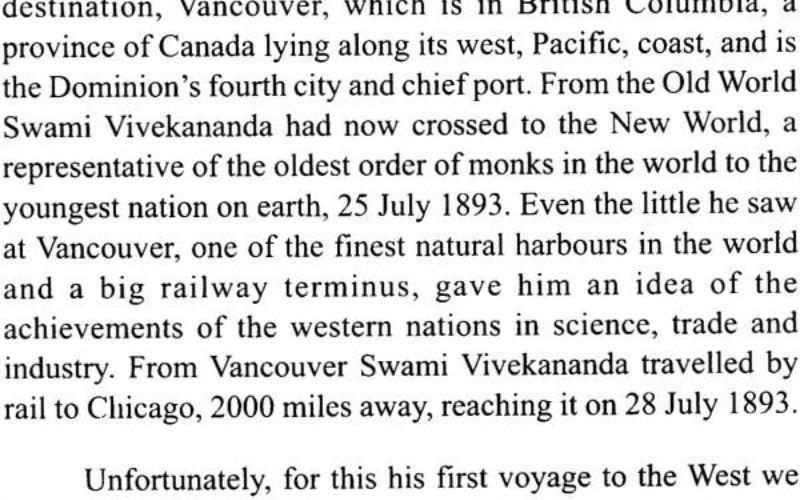Swami Vivekananda was a revered spiritual leader, philosopher, and social reformer who left an indelible mark on the world. Born as Narendranath Datta in 1863, he was a towering figure who played a pivotal role in the renaissance of Hinduism and the introduction of Indian philosophy to the Western world. His life and teachings continue to inspire millions across the globe, and his biography in English PDF format is a must-read for anyone seeking to understand the depth and breadth of his profound influence.
Early Life and Education
Swami Vivekananda was born in Kolkata, India, to an affluent and well-educated family. From a young age, he displayed a keen intellect and a deep interest in spirituality, philosophy, and the sciences. He excelled in his studies, earning a degree in Western philosophy and science from the Presidency College in Kolkata.
- Narendranath Datta was born on January 12, 1863, in Kolkata, India.
- He came from a family of scholars and intellectuals, and his early education was shaped by a diverse range of subjects, including Western philosophy, science, and Indian spiritual traditions.
- Narendranath’s thirst for knowledge and his quest for the ultimate truth led him to seek the guidance of the renowned mystic and saint, Ramakrishna Paramahamsa, who would become a pivotal figure in his life.
Influence of Ramakrishna Paramahamsa on Swami Vivekananda
Ramakrishna Paramahamsa, a renowned mystic and saint, had a profound impact on the young Narendranath Datta. Under Ramakrishna’s tutelage, Vivekananda explored the depths of Indian spiritual traditions and experienced profound spiritual realizations. This transformative period laid the foundation for Vivekananda’s later teachings and the establishment of the Ramakrishna Mission, a global organization dedicated to the ideals of service, spirituality, and social upliftment.
- Ramakrishna Paramahamsa recognized Narendranath’s spiritual potential and became his mentor, guiding him through various spiritual practices and experiences.
- Through his interactions with Ramakrishna, Narendranath underwent a profound transformation, shedding his skepticism and embracing the universal truths of Hinduism.
- Ramakrishna’s teachings on the unity of all religions and the importance of practical spirituality had a lasting impact on Vivekananda’s worldview and his future endeavors.
Swami Vivekananda’s Journey to the West
After the passing of Ramakrishna Paramahamsa, Vivekananda embarked on a journey to the West, determined to share the wisdom and insights of Hinduism with the world. His speeches and lectures at the World’s Parliament of Religions in Chicago in 1893 catapulted him to international fame, earning him the title of “the greatest figure in the Parliament.”
- In 1893, Vivekananda represented Hinduism at the World’s Parliament of Religions in Chicago, where his eloquent and inspiring speeches captivated the audience.
- His message of the unity of all religions and the universal truths of Hinduism resonated with people from diverse backgrounds, earning him widespread acclaim and recognition.
- Vivekananda’s journey to the West marked a significant milestone in his life, as he successfully introduced Indian philosophy and spirituality to the Western world, paving the way for a deeper understanding and appreciation of Hinduism.
The World’s Parliament of Religions
The World’s Parliament of Religions, held in Chicago in 1893, was a pivotal event in Swami Vivekananda’s life and the global dissemination of Hindu philosophy. His electrifying speeches at the Parliament, which emphasized the universal principles of Hinduism and the harmony of all religions, catapulted him to international fame and cemented his status as a spiritual leader of global significance.
- Vivekananda’s address at the World’s Parliament of Religions, where he opened with the iconic words “Sisters and brothers of America,” was a resounding success, earning him a standing ovation.
- His message of the unity of all religions, the universal truths of Hinduism, and the importance of practical spirituality resonated deeply with the audience, many of whom had never been exposed to Eastern philosophy before.
- The impact of Vivekananda’s speeches at the Parliament was profound, as they introduced Indian philosophy to the West and paved the way for a deeper understanding and appreciation of Hinduism on a global scale.
Teachings and Philosophy of Swami Vivekananda
Swami Vivekananda’s teachings and philosophy were rooted in the timeless wisdom of Hinduism, yet they were presented in a modern, accessible, and relevant manner. He emphasized the unity of all religions, the importance of practical spirituality, and the need for social upliftment and service to humanity.
- Vivekananda’s teachings emphasized the universal truths of Hinduism, including the concept of Advaita Vedanta (non-dualism), the divinity of the individual, and the importance of self-realization.
- He championed the idea of practical Vedanta, which called for the application of spiritual principles in everyday life, rather than mere theoretical study.
- Vivekananda’s philosophy also stressed the importance of social service and the upliftment of the marginalized sections of society, a reflection of his deep concern for the welfare of humanity.
Swami Vivekananda’s Impact on Indian Society and Culture
Swami Vivekananda’s influence on Indian society and culture was profound and far-reaching. He played a pivotal role in the spiritual and social renaissance of India, inspiring a new generation of thinkers, reformers, and leaders to work towards the betterment of the nation and its people.
- Vivekananda’s teachings and philosophy helped revitalize Hinduism and instilled a sense of pride and confidence in the Indian people, particularly during a time of colonial rule.
- His emphasis on social service and the upliftment of the marginalized sections of society inspired countless individuals to engage in philanthropic and social welfare activities.
- Vivekananda’s impact on Indian art, literature, and education was also significant, as his ideas and ideals influenced the work of prominent intellectuals, artists, and institutions.
Publications and Legacy of Swami Vivekananda
Swami Vivekananda left behind a rich legacy of publications, including his speeches, writings, and letters, which continue to inspire and guide people around the world. His works, which have been translated into numerous languages, offer a profound and comprehensive understanding of Hinduism, spirituality, and the human condition.
- Vivekananda’s most renowned publications include “Raja Yoga,” “Karma Yoga,” “Jnana Yoga,” and “Bhakti Yoga,” which delve into the various paths of spiritual realization.
- His collected works, published in a multi-volume set, cover a wide range of topics, from the nature of the divine to the role of education and social reform.
- Vivekananda’s legacy continues to be celebrated and honored through the Ramakrishna Mission, a global organization dedicated to the ideals of service, spirituality, and social upliftment, which he founded in 1897.
Swami Vivekananda’s Quotes
Swami Vivekananda’s words have left an indelible mark on the hearts and minds of people around the world. His profound insights and inspiring messages continue to resonate with individuals seeking guidance, wisdom, and spiritual fulfillment.
“Arise, awake, and stop not until the goal is reached.”
“The greatest religion is to be true to your own nature. Have faith in yourselves.”
“You have to grow from the inside out. None can teach you, none can make you spiritual. There is no other teacher but your own soul.”
“Take up one idea. Make that one idea your life – think of it, dream of it, and live on that idea. Let the brain, muscles, nerves, every part of your body, be full of that idea, and just leave every other idea alone. This is the way to success.”
Conclusion
Swami Vivekananda’s life and teachings continue to inspire and guide people around the world. His biography in English PDF format is a must-read for anyone seeking to deepen their understanding of this remarkable spiritual leader and his enduring legacy.
If you’re interested in learning more about Swami Vivekananda and his profound impact, we recommend exploring the following resources:
- “The Complete Works of Swami Vivekananda” – a comprehensive collection of his speeches, writings, and letters, available in PDF format.
- “Swami Vivekananda: A Biography” by Swami Nikhilananda – a well-researched and insightful biography that delves into the life and teachings of this remarkable spiritual leader.
- “The Life of Swami Vivekananda” by his Eastern and Western Disciples – a multi-volume set that offers a comprehensive and authoritative account of Vivekananda’s life and legacy.
Explore these resources to deepen your understanding of Swami Vivekananda and his enduring influence on the world.


